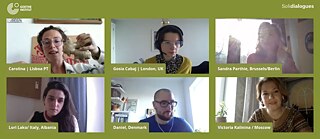“SoliDialogues”
Solidarity Over Populism

In times of increasing isolation and physical distancing, the Goethe-Instituts in Europe have opened a Europe-wide dialogue on solidarity called “SoliDialogues”. One of the participants reports.
By Sandra Parthie
New forms of togetherness
Forced into home office house arrest by the pandemic, I’m grateful for any distractions – especially when they lead to an intellectually stimulating chat with people from all over Europe. After all, I didn’t choose to live in Brussels by chance, but am a staunch European; interested in and curious about international dialogue. That’s why I accepted the invitation from the Goethe-Institut to take part in the “SoliDialogues” with pleasure.I filled out an online questionnaire so that the organisers could get an idea of my areas of interest and bring me together with suitable people. A few days later, the request arrived asking for my preference for the discussion period over the course of the two-day event. As much as distractions are welcome, the demands of everyday work have priority. Thankfully, the period could be set up as I wished.
My first impression of the “SoliDialogues” was a quick look into the Wonder virtual meeting space; like dipping my toe in cold water. As soon as I was “inside,” moderator Brenno picked me up and we met other explorers in a virtual “garden.” I chatted a while with Roloef from Amsterdam who remembered my hometown Berlin from the 1960s and was happy to practice his German with me. After the first look at the platform, we entered the actual discussion room a little later.
Looking for solutions
The topic in my dialogue round was Politics/Media/Society and I found myself in a virtual room with five people: Daniel (from Germany, living in Denmark), Victoria (from Russia), Gosia (from Poland, living in the United Kingdom), Lori (from Albania, living in Italy), and Carolina (from Portugal), who was also our moderator.There was a kick-off video that successfully served its purpose of getting the discussion rolling. However, there was no programme or script for the talk. We were asked to simply express our thoughts on the video and the various political issues raised in it. Interestingly, a trusting atmosphere arose relatively quickly. I didn’t know the people I was speaking with at all, met everyone for the first time and at first, I only knew where they came from and what their names were. Yet we all noticed immediately that we had similar mentalities and were driven by similar questions: How do we deal with the many societal challenges in the world, from climate change to poverty, from unfiltered media consumption to healthy eating? Should we feel guilty if we, especially during a pandemic, withdraw into our own lives while people in the Mediterranean are putting their lives at risk?
In the sixty minutes we had, we addressed a lot of topics and questions. We certainly weren’t able to solve them in an hour, but it was wonderful to know that many others are also looking for solutions. That’s another result of our discussion: Change begins in dialogue, with people outside of one’s own “bubble,” one’s own comfort zone and in real, direct conversation, not hidden behind screens and social media profiles. We agreed that we would like to continue the exchange and our first e-mails were already sent back and forth the next day.